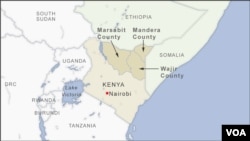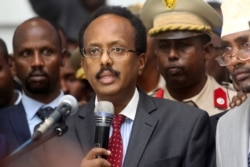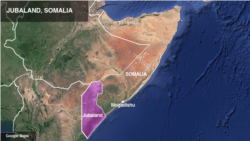Kenya has accused Somalia of an unwarranted attack on the Kenyan border town of Mandera, in the latest territorial dispute between the neighbors. Kenya and Somalia have long accused each other of encroaching on the other's territory and Kenya's remarks come as it faces pressure on the future of its troops fighting al-Shabab militants inside Somalia.
Somali media report that President Mohamed Abdullahi Farmajo spoke by phone with Kenyan counterpart Uhuru Kenyatta on the issues regarding security and that they agreed to work together on their common interests.
The conversation took place a day after the Kenyan leader accused the Horn of Africa nation of violating Kenyan borders during a clash along the Kenya-Somalia frontier. Reports say the clash took place in Somalia's semi-autonomous state of Jubaland and involved the Somali military and fighters linked to Ahmed Madobe, president of the Jubaland region.
Mohamed Maalim Mohamud, a senator in the Kenyan town of Mandera, across the border from Jubaland, told VOA tension is still high in the area.
“As of today, I am told there is a buildup of forces from both sides that soldiers of Jubaland are moving freely in our region, in our territory and building up and reinforcing themselves and anytime something can break out; it's very serious,” he said.
Mohamud also says the people of Mandera are paying the price for the unrest at the border and ongoing tension between the two countries.
“People who live in that part of the town vacated that place and went for safe stay elsewhere in the town. The schools have been closed. So it's that bad,” he said.
Kenya and Somalia's relationship has soured in recent months over the fate of Jubaland leader Madobe, who enjoys a good relationship with the government in Nairobi.
The Somali government disputes the Jubaland election of 2019, which gave Madobe another fours years to run the affairs of the state's Middle Juba, Lower Juba, and Gedo regions.
Professor Chacha Nyaigotti Chacha specializes in diplomacy and international relations at the University of Nairobi. He says both countries need to engage each other directly.
“For many years, Kenya has been hosting people from Somalia who were fleeing from molestation," he said. "It's very difficult for people to differentiate and find a way how they can best deal with the individuals who might be approaching them for discussions and whatever. So the bottom line then is, first of all, to recognize the central quality and the central power in Somalia and for Somalia's central power also to recognize that Kenya is an independent country. It has borders and it has a government which is functional and therefore anything that happens must always be sanitized and be blessed by the government systems.”
Separately, Kenya is considering withdrawing its troops from the African Union Mission in Somalia after eight years of fighting the Somali militant group al-Shabab. The matter is still being discussed in Kenya's National Security Council.
“We are safer when our security forces are here to defend the nation from within," said Caleb Amisi, a legislator who sits on Kenya’s Foreign Affairs and Defense Committee. "We went to Somalia as a matter of courtesy to our neighbors, but it was not a conventional war. We were perusing the enemy of our neighboring country. So we believe that we been able to make a milestone in that particular mandate, and it's high time they come back and secure our territory.”
Kenya sent troops to Somalia in 2011. Al-Qaida-linked al-Shabab has attacked Kenya for its involvement in supporting the AU mission in Somalia.






